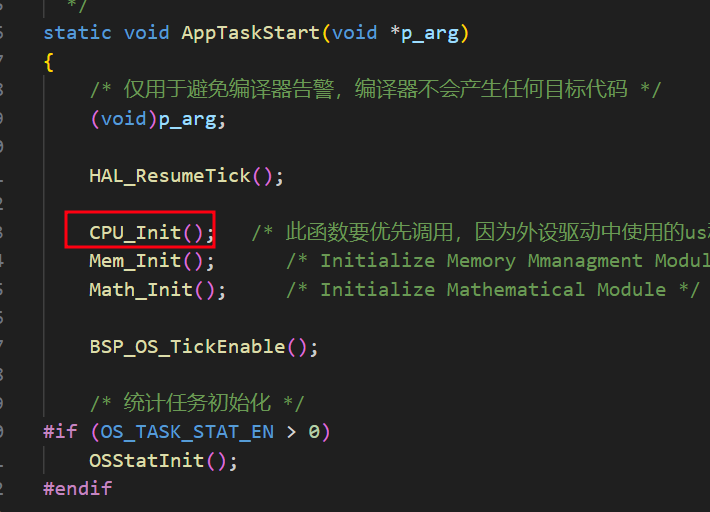CPU_TS_TmrRd()就是读取寄存器的函数,为什么Jlink断开以后就读取不到数值了呢
[C] 纯文本查看 复制代码 /*
*********************************************************************************************************
* CPU_TS_TmrRd()
*
* Description : Get current CPU timestamp timer count value.
*
* Argument(s) : none.
*
* Return(s) : Timestamp timer count (see Notes #2a & #2b).
*
* Caller(s) : CPU_TS_Init(),
* CPU_TS_Get32(),
* CPU_TS_Get64(),
* CPU_IntDisMeasStart(),
* CPU_IntDisMeasStop().
*
* This function is an INTERNAL CPU module function & MUST be implemented by application/
* BSP function(s) [see Note #1] but SHOULD NOT be called by application function(s).
*
* Note(s) : (1) CPU_TS_TmrRd() is an application/BSP function that MUST be defined by the developer
* if either of the following CPU features is enabled :
*
* (a) CPU timestamps
* (b) CPU interrupts disabled time measurements
*
* See 'cpu_cfg.h CPU TIMESTAMP CONFIGURATION Note #1'
* & 'cpu_cfg.h CPU INTERRUPTS DISABLED TIME MEASUREMENT CONFIGURATION Note #1a'.
*
* (2) (a) Timer count values MUST be returned via word-size-configurable 'CPU_TS_TMR'
* data type.
*
* (1) If timer has more bits, truncate timer values' higher-order bits greater
* than the configured 'CPU_TS_TMR' timestamp timer data type word size.
*
* (2) Since the timer MUST NOT have less bits than the configured 'CPU_TS_TMR'
* timestamp timer data type word size; 'CPU_CFG_TS_TMR_SIZE' MUST be
* configured so that ALL bits in 'CPU_TS_TMR' data type are significant.
*
* In other words, if timer size is not a binary-multiple of 8-bit octets
* (e.g. 20-bits or even 24-bits), then the next lower, binary-multiple
* octet word size SHOULD be configured (e.g. to 16-bits). However, the
* minimum supported word size for CPU timestamp timers is 8-bits.
*
* See also 'cpu_cfg.h CPU TIMESTAMP CONFIGURATION Note #2'
* & 'cpu_core.h CPU TIMESTAMP DATA TYPES Note #1'.
*
* (b) Timer SHOULD be an 'up' counter whose values increase with each time count.
*
* (1) If timer is a 'down' counter whose values decrease with each time count,
* then the returned timer value MUST be ones-complemented.
*
* (c) (1) When applicable, the amount of time measured by CPU timestamps is
* calculated by either of the following equations :
*
* (A) Time measured = Number timer counts * Timer period
*
* where
*
* Number timer counts Number of timer counts measured
* Timer period Timer's period in some units of
* (fractional) seconds
* Time measured Amount of time measured, in same
* units of (fractional) seconds
* as the Timer period
*
* Number timer counts
* (B) Time measured = ---------------------
* Timer frequency
*
* where
*
* Number timer counts Number of timer counts measured
* Timer frequency Timer's frequency in some units
* of counts per second
* Time measured Amount of time measured, in seconds
*
* (2) Timer period SHOULD be less than the typical measured time but MUST be less
* than the maximum measured time; otherwise, timer resolution inadequate to
* measure desired times.
*********************************************************************************************************
*/
#if (CPU_CFG_TS_TMR_EN == DEF_ENABLED)
CPU_TS_TMR CPU_TS_TmrRd (void)
{
CPU_TS_TMR ts_tmr_cnts;
ts_tmr_cnts = (CPU_TS_TMR)CPU_BSP_REG_DWT_CYCCNT; /* Read the timer count register */
return (ts_tmr_cnts);
}
#endif | 



 发表于 2024-6-18 10:48:31
发表于 2024-6-18 10:48:31
 楼主
楼主




 发表于 2024-6-18 15:01:39
发表于 2024-6-18 15:01:39

